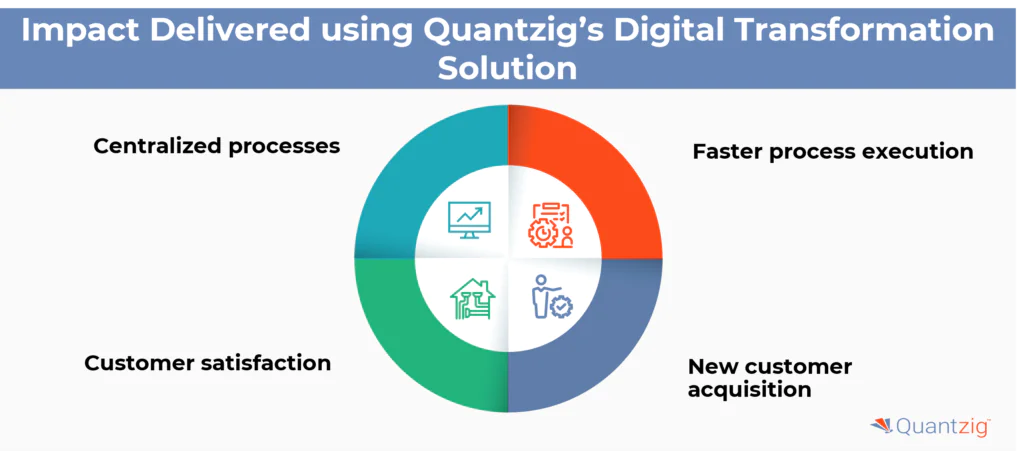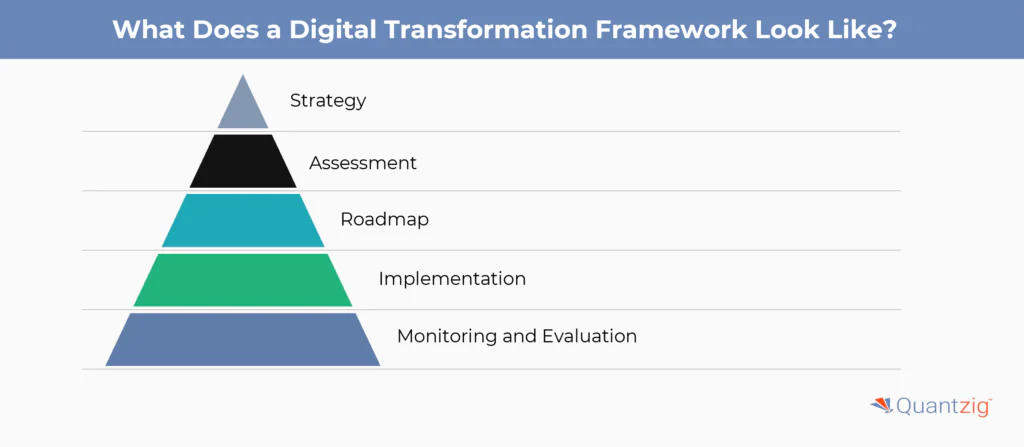Written By: Sudeshna Ghosh
Table of Contents
Key Takeaways
- Quantzig’s digital transformation solution helped a US-based retail brand to experience a 40% uplift in new customer acquisition and improve transparency across stakeholders.
- Digital transformation is essential for businesses to stay competitive and adapt to the rapidly evolving digital landscape. Leveraging technologies like AI, machine learning, and cloud computing can streamline operations, enhance efficiency, and drive growth.
- Key trends such as no-code development, composable business, Everything as a Service (XaaS), AI and ML, hybrid workforce models, cloud-native technologies, cybersecurity, edge computing, IoT, and digital twins are revolutionizing business operations and enabling companies to unlock significant value.
- Quantzig offers a range of digital transformation solutions including no-code development, composable business solutions, AI and ML integration, cloud-native application development, and cybersecurity.
Introduction to Digital Transformation Trends
Nowadays, organizations are under immense pressure to stay ahead of the curve and unlock new value through strategic digital transformation. As technology continues to evolve at breakneck speed, companies must adapt and innovate to remain competitive, drive growth, and enhance customer experiences. The most successful organizations are those that leverage cutting-edge digital solutions to streamline operations, boost efficiency, and create new revenue streams.
In this article, we will explore the top digital transformation trends that are revolutionizing the way businesses operate and thrive in the digital age. From AI-powered automation to cloud-based infrastructure and data-driven decision-making, we will delve into the most impactful and transformative technologies that are shaping the future of business and driving success.
Book a demo to experience the meaningful insights we derive from data through our analytical tools and platform capabilities. Schedule a demo today!
Request a Free DemoQuantzig’s Expertise in Digital Transformation Framework for a US-Based E-commerce Retail Brand
| Category | Details |
|---|---|
| Client Details | An e-commerce retailer based in the United States with annual revenue of $10bn+. |
| Challenges Faced by The Client | The e-commerce retailer faced significant operational inefficiencies due to manual processes, stakeholder dependencies, and extended turnaround times for customer queries. |
| Solutions Offered by Quantzig | Quantzig offered solutions that included identifying high-impact processes for automation, creating a centralized platform with robust access controls and alerts, and developing a centralized AI-based auto-response platform leveraging natural language processing (NLP) to enhance customer service capabilities. |
| Impact Delivered | Improved transparency across stakeholders and reduced errors. Process execution was accelerated by 3x. Customer satisfaction increased by 70%, with 95% of customer queries responded to in less than 5 seconds. A 40% uplift in new customer acquisition. |
Client Details
An e-commerce retailer based in the United States was struggling with inefficient manual processes and stakeholder dependencies, hindering their ability to respond quickly to market changes and customer needs.
Challenges in Digital Transformation Faced by the Client
The e-commerce retailer faced significant operational inefficiencies due to manual processes and stakeholder dependencies. These processes were error-prone, time-consuming, and hindered the organization’s ability to respond swiftly to market changes and customer needs. The client struggled with extended turnaround times for customer queries, which negatively impacted customer satisfaction and loyalty. Additionally, they faced challenges in initiating their digital transformation journey, including identifying the right starting point and selecting appropriate technologies.
Digital Transformation Solution Offered by Quantzig for the Client
- Quantzig played a pivotal role in the client’s digital transformation journey by first identifying high-impact processes that needed automation. Through a meticulous assessment, Quantzig mapped out the stakeholders involved in these processes and delineated their respective responsibilities.
- Subsequently, they spearheaded the creation of a centralized platform equipped with robust access controls, alerts, and other essential functionalities. This platform served as a unified hub, ensuring that accurate and up-to-date information became readily accessible across teams and processes.
- By establishing a single source of truth, Quantzig enabled streamlined operations, reduced errors, and facilitated faster decision-making, ultimately alleviating the bottlenecks that had been hindering the client’s operational efficiency.
- Quantzig further revolutionized the client’s customer service capabilities by developing a centralized AI-based auto-response platform. This cutting-edge system harnessed the power of natural language processing (NLP) to swiftly decode and understand customer queries. Leveraging a comprehensive backend Q&A repository, the platform provided standardized responses to 95% of the queries in less than 5 seconds, ensuring rapid and consistent interactions with customers.
- For more complex queries, the system intelligently directed them to customer care executives for personalized assistance. This platform’s accessibility across various devices, including laptops, mobiles, and iPads, made it effortless for customers to engage with the brand, significantly enhancing the overall customer experience and bolstering the client’s reputation for responsiveness and reliability.
Impact Delivered using Quantzig’s Expertise
The digital transformation led to significant improvements in the client’s operations and customer satisfaction. Key outcomes included:
- Centralized processes: Improved transparency across stakeholders and reduced errors.
- Faster process execution: Process execution was accelerated by 3x, enabling the client to respond more quickly to market changes and customer needs.
- Customer satisfaction: Customer satisfaction increased by 70%, with 95% of customer queries responded to in less than 5 seconds.
- New customer acquisition: The client saw a 40% uplift in new customer acquisition, driven by enhanced customer experiences and responsiveness.
Quantzig’s digital transformation solutions empowered the e-commerce retailer to streamline operations, enhance customer experiences, and drive business growth. By leveraging automation, data-driven insights, and agility, the client was able to stay competitive and thrive in a rapidly evolving market.
Also Read: Understanding Omnichannel Marketing Analytics for Businesses
Get started with your complimentary trial today and delve into our platform without any obligations. Explore our wide range of customized, consumption driven analytical solutions services built across the analytical maturity levels.
Start your Free Trial TodayWhat is Digital Transformation?
Digital transformation is the integration of digital technology into all areas of a business, fundamentally changing how it operates and delivers value to customers. This process involves leveraging advanced technologies such as artificial intelligence (AI), machine learning (ML), cloud computing, and the Internet of Things (IoT) to enhance efficiency, productivity, and customer experiences. Digital transformation is not just about adopting new technologies; it is about transforming the very fabric of an organization to stay competitive in today’s rapidly evolving business landscape.
What is a Digital Transformation Trend?
A digital transformation trend refers to the emerging and evolving technologies, strategies, and practices that are shaping the way organizations approach digital transformation. These trends encompass a wide range of areas, including automation, AI, ML, cloud computing, cybersecurity, and more. Staying informed about these trends is crucial for businesses to stay ahead of the competition and unlock value from their digital transformation initiatives.
Why Does Digital Transformation Matter?
Digital transformation matters because it is essential for businesses to remain competitive and relevant in today’s digital age. The COVID-19 pandemic has accelerated the need for digital transformation, as companies must adapt to new customer behaviors, remote workforces, and supply chain disruptions. Digital transformation enables organizations to streamline operations, improve efficiency, enhance customer experiences, and drive innovation. It is no longer a choice but a necessity for survival and growth.
How Has the COVID-19 Pandemic Changed Digital Transformation?
The COVID-19 pandemic has significantly accelerated digital transformation initiatives across industries. With the sudden shift to remote work, online services, and supply chain disruptions, companies have been forced to adapt quickly to stay afloat. According to Quantzig experts, the pandemic has sped up digital transformation by an average of six years, with 97% of companies stating that it has accelerated their digital transformation initiatives.
What Does a Digital Transformation Framework Look Like?
A digital transformation framework typically involves several key components:
- Strategy: Define the organization’s digital vision and goals.
- Assessment: Evaluate the current state of the organization and identify areas for improvement.
- Roadmap: Develop a roadmap for digital transformation, outlining key initiatives and timelines.
- Implementation: Execute the digital transformation initiatives, leveraging technologies such as AI, ML, and cloud computing.
- Monitoring and Evaluation: Continuously monitor and evaluate the progress of digital transformation initiatives, making adjustments as needed.
Digital Transformation Trends That Drive a Competitive Advantage
- No-Code and Automation-Driven Efficiency: No-code technologies empower non-technical users to create applications and automate processes without requiring traditional programming knowledge, fostering rapid innovation and efficiency.
- Composable Business: Composable business involves breaking down monolithic systems into smaller, modular components that can be easily integrated and reconfigured to adapt to changing business needs.
- Everything as a Service (XaaS): XaaS involves delivering products and services over the internet, enabling greater flexibility and scalability.
- Artificial Intelligence (AI) and Machine Learning (ML): Generative AI and ML are revolutionizing decision-making processes, automation, and predictive analytics across various industries.
- Hybrid Workforce Model: The hybrid workforce model combines human and machine interactions to optimize workflows and enhance productivity.
- Cloud-Native Technologies: Cloud-native technologies enable organizations to build and deploy applications quickly and efficiently, leveraging the scalability and flexibility of cloud computing.
- Cybersecurity: Cybersecurity measures are critical to protect digital infrastructures from evolving cyber threats.
- Edge Computing: Edge computing involves processing data closer to its source, reducing latency, and improving real-time processing capabilities.
- Internet of Things (IoT): IoT enables the connection and integration of devices, sensors, and systems, driving innovation and efficiency in various industries.
- Digital Twins: Digital twins involve creating virtual replicas of physical systems, enabling real-time monitoring, simulation, and optimization.
Quantzig Solutions Portfolio
Quantzig Solutions offers a comprehensive portfolio of digital transformation solutions designed to help organizations unlock value from their digital transformation initiatives. Our solutions include:
- No-Code Development: Our no-code development platform empowers non-technical users to create applications and automate processes without requiring traditional programming knowledge.
- Composable Business Solutions: Our composable business solutions enable organizations to break down monolithic systems into smaller, modular components that can be easily integrated and reconfigured.
- AI and ML Integration: Our AI and ML integration services help organizations harness the power of AI and ML to optimize decision-making processes, automation, and predictive analytics.
- Cloud-Native Application Development: Our cloud-native application development services enable organizations to build and deploy applications quickly and efficiently, leveraging the scalability and flexibility of cloud computing.
- Cybersecurity Solutions: Our cybersecurity solutions provide comprehensive protection for digital infrastructures, safeguarding against evolving cyber threats.
By leveraging these digital transformation trends and solutions, organizations can unlock value from their digital transformation initiatives, drive innovation, and stay ahead of the competition in today’s rapidly evolving business landscape.
Also Read: Guide to Advanced Marketing Analytics Solutions and Its Business Benefits
Experience the advantages firsthand by testing a customized complimentary pilot designed to address your specific requirements. Pilot studies are non-committal in nature.
Request a Free PilotConclusion
Digital transformation is no longer a choice but a necessity for businesses looking to stay competitive and relevant in today’s digital age. By embracing the top digital transformation trends outlined in this blog post, organizations can unlock significant value, drive innovation, and gain a competitive advantage in their respective industries. However, successful digital transformation requires a holistic approach that involves aligning the entire organization, from the C-suite to frontline employees, to embrace change and adopt new technologies. By investing in digital transformation initiatives and fostering a culture of innovation, businesses can position themselves for long-term success in the rapidly evolving digital landscape.






